

Who's in charge – you or your brain? David Eagleman, neuroscientist at Baylor College of Medicine in Texas and bestselling author It is clear at this point that we are irrevocably tied to the 3lb of strange computational material found within our skulls.
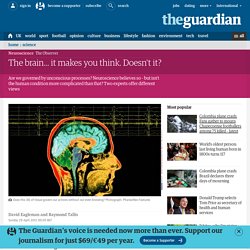
The brain is utterly alien to us, and yet our personalities, hopes, fears and aspirations all depend on the integrity of this biological tissue. How do we know this? Why can’t the world’s greatest minds solve the mystery of consciousness? One spring morning in Tucson, Arizona, in 1994, an unknown philosopher named David Chalmers got up to give a talk on consciousness, by which he meant the feeling of being inside your head, looking out – or, to use the kind of language that might give a neuroscientist an aneurysm, of having a soul.
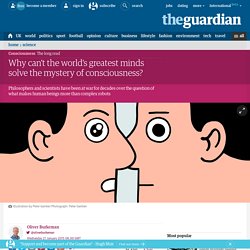
Though he didn’t realise it at the time, the young Australian academic was about to ignite a war between philosophers and scientists, by drawing attention to a central mystery of human life – perhaps the central mystery of human life – and revealing how embarrassingly far they were from solving it. Leading Theory About How Consciousness Works May Be Wrong. Scientists’ attempts to discern the neurological activities that constitute consciousness have taken a dramatic twist, after a recent study appeared to contradict one of the leading theories on the topic.
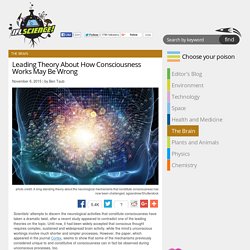
Until now, it had been widely accepted that conscious thought requires complex, sustained and widespread brain activity, while the mind’s unconscious workings involve much shorter and simpler processes.
Thinking. The Self. Meditation & Mindfulness. NDE's & OBE's. Happiness Studies. Julian-Jaynes-Origin-of-Consciousness-in-the-Breakdown-of-the-Bicameral-Mind.pdf. Consciousness May Not Be As Powerful As You Think. By Monica Joshi The quality or state of awareness, or being aware of an external object or something within yourself, in short — consciousness, is the one thing that we have believed defines us as being the creatures that we are.
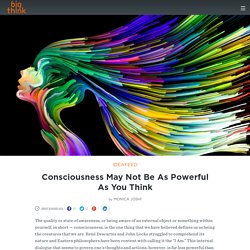
René Descartes and John Locke struggled to comprehend its nature and Eastern philosophers have been content with calling it the “I Am.” This internal dialogue that seems to govern one's thoughts and actions, however, is far less powerful than people believe, according to a new theory proposed by a professor of psychology.
Discovery of quantum vibrations in 'microtubules' inside brain neurons supports controversial theory of consciousness. How the Mind Works. Antonio Damasio: The Quest to Understand Consciousness. 4 Ways to Make Your Brain Work Better. You're a busy person.
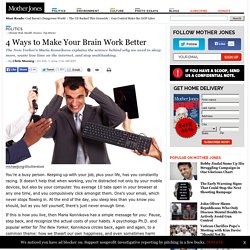
Keeping up with your job, plus your life, has you constantly racing. It doesn't help that when working, you're distracted not only by your mobile devices, but also by your computer. You average 10 tabs open in your browser at any one time, and you compulsively click amongst them. Researchers reveal the 'feelgood foods' that could make you happy (and yes, chocolate is on the list) Scientists believe they have discovered the chemical responsible for the effect 'happy foods' include chocolate, blueberries, raspberries, strawberries and even a cup of tea By Mark Prigg Published: 12:40 GMT, 20 August 2012 | Updated: 19:39 GMT, 20 August 2012 The secret to why a bar of chocolate and even a cup of tea can make us feed good may finally have been discovered.
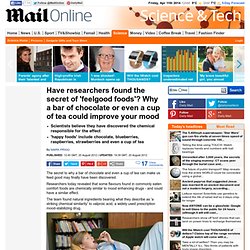
Researchers today revealed that some flavours found in commonly eaten comfort foods are chemically similar to mood enhancing drugs - and could have a similar effect. The team found natural ingredients bearing what they describe as 'a striking chemical similarity' to valproic acid, a widely used prescription mood-stabilizing drug. Researchers believe the flavours in foods such as chocolate is chemically similar to a mood altering drug, and could explain why some food makes us feel better 'Molecules in chocolate, a variety of berries and foods containing omega-3 fatty acids have shown positive effects on mood.
Jaak Panksepp Pinned Down Humanity's 7 Primal Emotions. #98: Brain Signal For Awareness. Many brain-damaged patients written off as vegetative are actually alert despite being immobilized.

Now doctors may be able to recognize this hidden group, according to neuroscientist Melanie Boly of the Cyclotron Research Center in Belgium. To seek the neural pattern for consciousness, Boly and her colleagues measured brain activity in vegetative, minimally conscious, and healthy subjects while playing a series of tones. Normally the brain reacts by sending information from the temporal cortex to the frontal cortex (a center of higher-order thought) and back in a loop. Boly found that the healthy and minimally conscious subjects showed neural activity throughout the complete loop, while truly vegetative ones did not. If the finding is confirmed, it could allow doctors to focus treatment on patients wrongly diagnosed as vegetative. Preserved Feedforward But Impaired Top-Down Processes in the Vegetative State. Defining Experience. Much empirical research is devoted to the “hard problem,” as the philosopher David Chalmers has put it, of why human information processing is accompanied by the subjective experience we call consciousness.
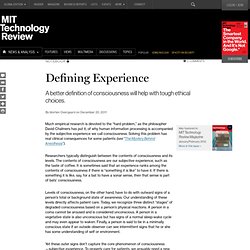
Solving this problem has real clinical consequences for some patients (see “The Mystery Behind Anesthesia”). Researchers typically distinguish between the contents of consciousness and its levels. Consciousness Conference Hits All the Stops.